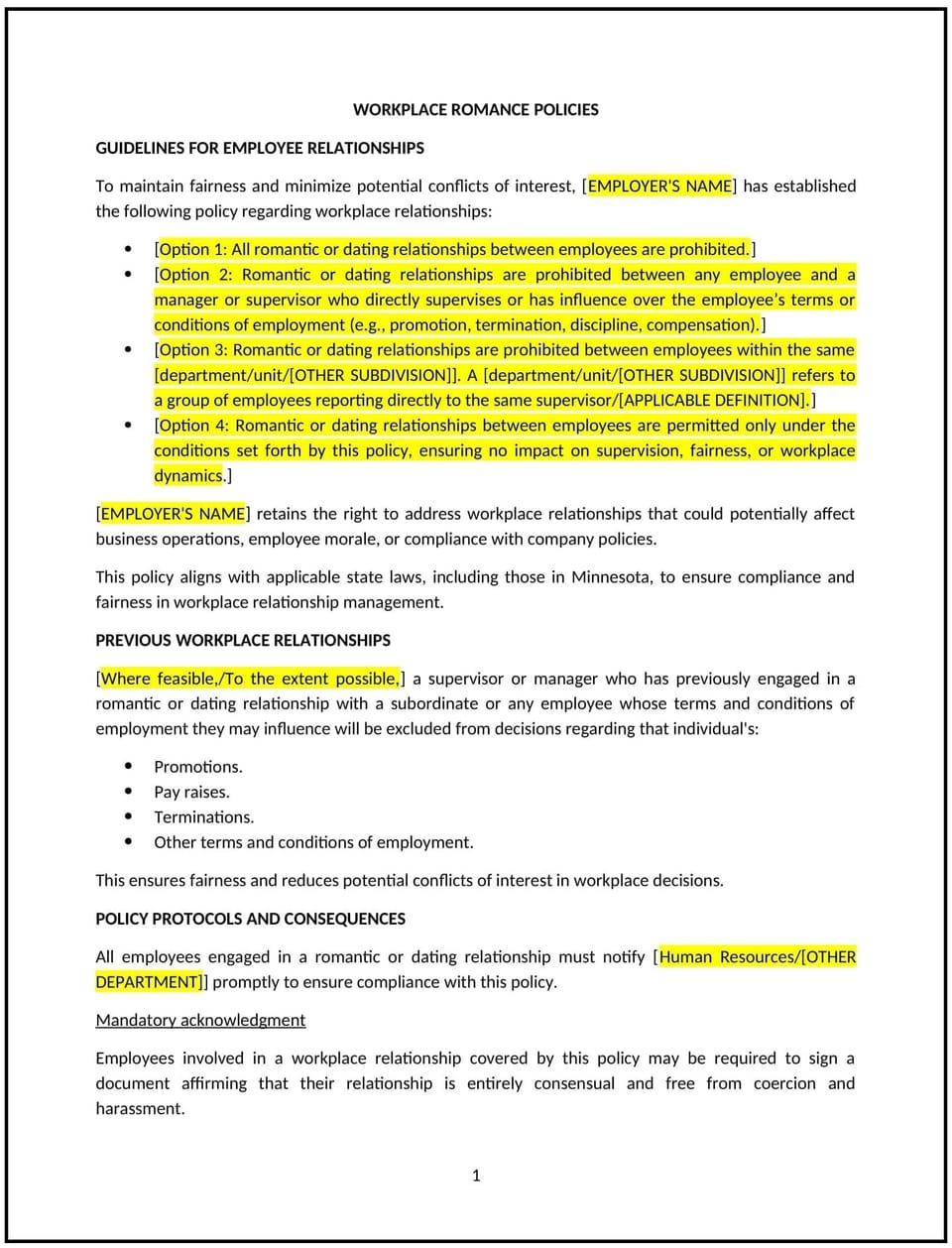Workplace romance policy (Minnesota): Free template

Workplace romance policy (Minnesota)
This workplace romance policy is designed to help Minnesota businesses manage and address romantic relationships between employees. The policy outlines expectations regarding workplace behavior, disclosure of relationships, and potential conflicts of interest to ensure that personal relationships do not interfere with the professional environment.
By implementing this policy, businesses can foster a respectful and productive work environment while managing the potential risks associated with workplace romance.
How to use this workplace romance policy (Minnesota)
- Define workplace romance: Clearly define what constitutes a workplace romance, including relationships between employees at the same level, as well as between supervisors and subordinates.
- Address disclosure requirements: Specify when and how employees should disclose workplace romances, especially if they involve direct reporting relationships. Require disclosure to HR or management to ensure transparency and mitigate conflicts of interest.
- Establish boundaries for supervisor-subordinate relationships: Outline the potential issues with supervisor-subordinate relationships, such as favoritism or conflicts of interest, and determine whether such relationships are allowed or if employees must be reassigned to prevent conflicts.
- Promote professional behavior: Encourage employees to maintain professionalism at all times, regardless of personal relationships, to ensure that workplace dynamics remain respectful and productive.
- Prevent retaliation: Make it clear that employees involved in a romance should not face retaliation or discrimination based on their relationship. The policy should ensure a fair process for managing any issues that arise.
- Clarify the consequences of policy violations: Specify the disciplinary action that may result from violations of the policy, such as failure to disclose a relationship or inappropriate behavior stemming from a workplace romance.
- Offer guidance for handling conflicts: Provide procedures for addressing any conflicts or concerns that arise from workplace romances, ensuring that employees have a clear process for resolving issues professionally.
Benefits of using this workplace romance policy (Minnesota)
Implementing this policy provides several advantages for Minnesota businesses:
- Reduces the risk of conflicts of interest: Clear guidelines help mitigate potential conflicts of interest, such as favoritism or bias, that could arise from romantic relationships between employees.
- Promotes fairness: By establishing transparent rules for workplace relationships, businesses create an environment where all employees are treated equally and fairly.
- Maintains professionalism: A workplace romance policy encourages employees to maintain professional behavior and focus on work, preventing personal relationships from affecting productivity or workplace dynamics.
- Protects the company’s reputation: Addressing workplace romance proactively can help protect the company’s reputation, particularly in industries where employee conduct is closely scrutinized.
- Reflects Minnesota-specific considerations: The policy can be tailored to align with Minnesota’s specific labor laws and workplace culture, ensuring that it addresses the unique challenges of businesses in the state.
Tips for using this workplace romance policy (Minnesota)
- Communicate clearly: Ensure that all employees are aware of the workplace romance policy, including the expectations for disclosing relationships, maintaining professionalism, and the potential consequences of violating the policy.
- Encourage open dialogue: Foster an environment where employees feel comfortable discussing relationships or conflicts with HR or management without fear of retaliation.
- Review and update regularly: Review the policy regularly to ensure it remains aligned with Minnesota’s laws, evolving workplace trends, and the company’s needs.
- Monitor the impact on workplace dynamics: Keep an eye on how workplace romances may affect team dynamics and productivity. Take appropriate action if conflicts or disruptions occur.
- Maintain fairness and confidentiality: Handle all disclosures and related issues confidentially and fairly, ensuring that no employee is unfairly treated or penalized for their personal relationships.
Q: What constitutes a workplace romance?
A: A workplace romance refers to a romantic or intimate relationship between employees, including those at the same level or between supervisors and subordinates. The policy should clearly define the scope of relationships covered by the guidelines.
Q: Do employees need to disclose a workplace romance?
A: Employees should disclose any romantic relationships to HR or management, especially if it involves a supervisor-subordinate relationship, to avoid conflicts of interest and ensure transparency within the organization.
Q: Can supervisors have romantic relationships with subordinates?
A: While the policy may allow relationships, businesses should establish guidelines for supervisor-subordinate relationships, such as reassignment or other measures to avoid conflicts of interest and ensure fairness.
Q: What should I do if I feel uncomfortable with a workplace romance?
A: Employees should report any concerns about a workplace romance to HR, especially if it creates discomfort, favoritism, or conflicts of interest. The business should have a procedure for handling these concerns confidentially.
Q: What happens if an employee fails to disclose a workplace romance?
A: If an employee fails to disclose a romance that could create a conflict of interest or affect workplace dynamics, the company may take disciplinary action. Consequences will vary depending on the severity of the situation.
Q: How can businesses prevent workplace romances from affecting work?
A: Businesses should promote professionalism, require disclosure of relationships, and establish clear boundaries for supervisor-subordinate relationships. Regular training on maintaining workplace conduct can also help prevent issues.
Q: Can employees face retaliation for being in a workplace romance?
A: No, the policy should explicitly state that employees involved in a workplace romance will not face retaliation or discrimination. Businesses should handle all concerns fairly and respectfully to prevent any adverse consequences.
Q: How often should this policy be reviewed?
A: The policy should be reviewed regularly, at least annually, or whenever there are significant changes to the company’s structure, Minnesota state laws, or workplace dynamics that may impact the policy’s effectiveness.
This article contains general legal information and does not contain legal advice. Cobrief is not a law firm or a substitute for an attorney or law firm. The law is complex and changes often. For legal advice, please ask a lawyer.


